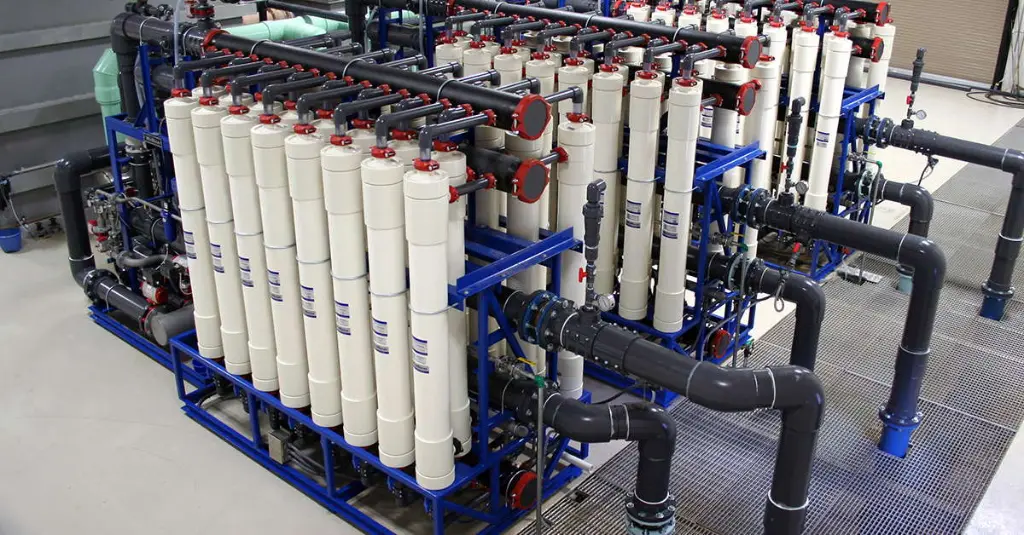
Ultrafiltration (UF)
Ultrafiltration (UF) is a membrane-based separation process widely used in water and wastewater treatment. It employs semipermeable membranes with pore sizes typically ranging from 0.01 to 0.1 microns. The main purpose of ultrafiltration is to remove colloids, suspended solids, bacteria, and viruses from feed water, producing permeate with reduced turbidity, color, and pathogen content. This makes UF popular in applications such as municipal water purification, industrial process water, and pretreatment for reverse osmosis systems.
One of the key advantages of ultrafiltration is its ability to operate at relatively low pressures, leading to lower energy consumption. Automated cleaning processes help extend membrane lifespan and maintain consistent filtrate quality. Ultrafiltration systems are compact, easy to install, and require minimal operator intervention, making them cost-effective solutions. With high separation efficiency and versatility, ultrafiltration plays a vital role in providing safe water for drinking, industrial, and commercial purposes. Thus, it remains an ideal choice.
Ultrafiltration Product Series
Check our product groups designed for your needs
Residental or Light Commercial
Ultrafiltration systems for resindental usage or light commercial low capacity requirements.
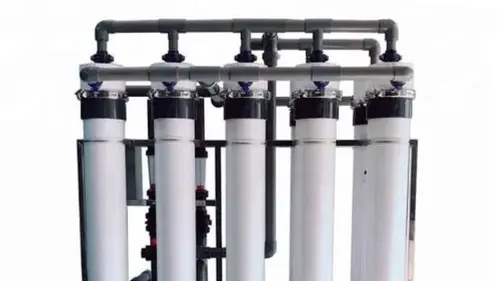
Industrial Ultrafiltration Systems
High capacity ultrafiltration systems with automatic cleaning systems for industrial purposes.

Custom-Designed Ultrafiltration
Custom-designed ultrafiltration systems for lab or industrial purposes.
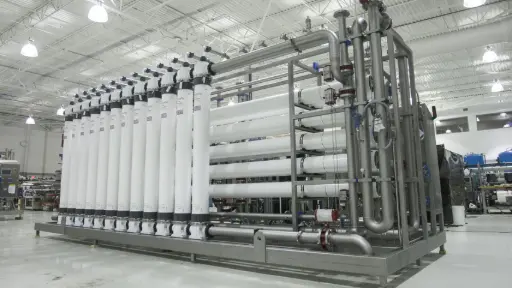
Ultrafiltration Systems for Residental and Commercial Usage

UF-C Series Ultrafiltration Systems
Designed for homes and small businesses, UF-C series offers dependable ultrafiltration with minimal maintenance. Its compact footprint and straightforward installation make it an excellent choice for ensuring clean, safe water.
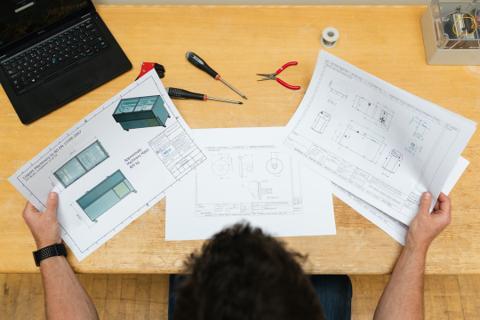
UF-M Series Ultrafiltration Systems
Ideal for larger households or commercial operations, UF-M series delivers higher flow rates and advanced membrane technology. This robust system ensures consistent water quality while reducing energy consumption.
Ultrafiltration Systems for Industrial Usage

UF-HI Series Ultrafiltration Systems
Crafted for the most rigorous applications, UF-HI series guarantees reliable performance with a focus on durability. Equipped with automated cleaning functions, it delivers sustained throughput for continuous industrial operation.
Custom-Design Systems For Your Needs
Discover tailored custom system solutions designed to meet your specific requirements. Enhance water quality and system performance with our customizable options today!

Phone
Address
Akçaburgaz, 3026. Sk No:28, 34522 Esenyurt/İstanbul TURKEY
Trusted references
Discover the trusted brands that rely on our ultrafiltration systems and explore all our references with a single click.
See our all references






Ultrafiltration (UF) systems are filtration technologies that operate under pressure, similar to reverse osmosis membranes, to separate particles with higher molecular weight than water itself. These systems are highly effective at removing suspended solids and particulates in water. Ultrafiltration systems can achieve filtration performance down to 5 nanometers, making them more precise than microfiltration systems. For this reason, their operating pressure is slightly higher compared to microfiltration, typically ranging between 2 and 4 bars. The average flow capacity is about 40 to 120 liters per square meter of membrane surface area. They are often used in industrial water treatment projects instead of multimedia sand filters.
An ultrafiltration unit can filter all suspended solids at a microscopic level. UF membranes use a special membrane technique known as hollow fiber, enabling them to remove solid particles down to around 0.025 microns. Considering that a human hair has a thickness of 70–80 microns, it is easy to see how effective ultrafiltration devices are for micro-level water filtration.
In UF systems, performance is measured using a parameter called MWCO (Molecular Weight Cut Off). This parameter is determined by how long a UF membrane can retain at least 90% of substances whose molecular weight is higher than water (such as proteins or glycols). For example, if a UF membrane can prevent at least 90% of these substances from passing for two days, but this retention drops to 89% after two days, the MWCO for this membrane is considered to be 2. Because MWCO is not an international standard, it is not a universally recognized measurement principle, but it is frequently used in technical evaluations.
Common applications of ultrafiltration systems include:
• Recovering proteins from substances like milk or whey, concentrating sugars in fruit juice, removing bacteria, suspended solids, and organics from bottled drinking water.
• Degreasing in wastewater systems.
• Removing bacteria and viruses in municipal water, producing usable water from wastewater.
• Serving as a pretreatment step in RO systems to remove suspended solids.
Differences Between UF and RO Systems
UF systems are generally used to separate suspended solids, which may not be sufficient for removing dissolved substances in water. Reverse osmosis systems, on the other hand, filter at a molecular level, including dissolved substances. UF performance typically lies between microfiltration and nanofiltration.
How Does It Work?
Ultrafiltration systems operate on the same principle as standard sediment filters. Suspended solids are trapped by the porous structure of UF membranes. Essentially, pressurized water is forced through the membranes, allowing the lower molecular weight water to pass. A typical UF system diagram is shown below:
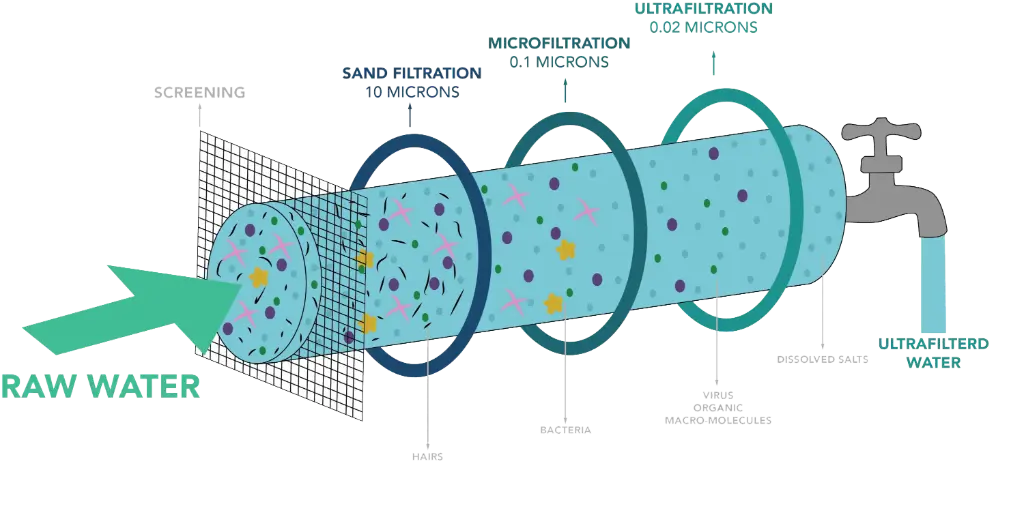
Advantages
UF membrane systems offer advanced filtration capabilities with low energy consumption, making them highly effective as a pretreatment stage. In addition to reducing turbidity, a UF system filters pathogens like bacteria and viruses, differentiating it from sand-based multimedia filters. In summary, UF systems provide:
• High filtration efficiency at high flow rates.
• Advanced pathogen filtration (bacteria, viruses, etc.).
• Long lifespan and high performance thanks to backwashing capabilities.
• Compact design options due to modular configurations.
• High chemical and temperature resistance.
Ultrafiltration Membranes
UF membranes can be made from organic polymers or inorganic materials. The choice depends on specific parameters like the molecular weight of the substances to be filtered and their interaction with polymer chains. In the water treatment industry, hollow fiber membranes are predominantly used. The type of membrane material is important for chemical, thermal, and mechanical stability, though it typically does not cause significant differences in flux or filtration performance.
Ultrafiltration System Design
Ultrafiltration typically operates at low pressures—generally in the range of 0.5 to 5 bars. Such low operating pressures allow the process to run with low-power pumps or even without pumps in some cases, offering a cost-effective operation.
UF membranes are produced in modular form on a porous support layer, with each membrane unit referred to as a “module.” Each module has an inlet for the feed water, a concentrate outlet, and a permeate outlet. There are two main module types on the market: spiral-wound and hollow fiber membranes. Other module types—such as rotating modules, vibrating modules, or Dean vortex modules—are custom-designed for specific processes.
Each module design has unique advantages and disadvantages in terms of cleaning, operation, pressure drop, and filtration performance. Compared to other module types, hollow fiber modules are advantageous for ease of cleaning and operational efficiency; spiral-wound membranes also offer similar advantages. Other specialized membrane types come with higher operating and ownership costs but may be preferred for specific industrial applications.